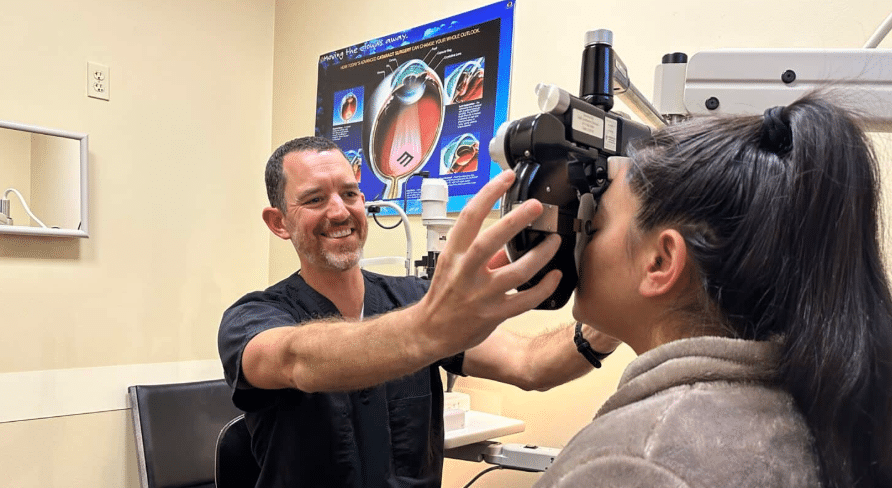General Eye Care,LASIK,Refractive Lens Exchange

Still 20/20 After LASIK or RLE? Here’s Why You Still Need Yearly Eye Exams
Vision correction procedures like LASIK and Refractive Lens Exchange (RLE) can dramatically change your life for the better. But even with crisp vision, your eyes can develop conditions that don’t cause symptoms at first. Annual comprehensive exams protect your results and your long-term eye health.
But that’s a misconception, and it could put your long-term eye health at risk.
“Even when you’re seeing 20/20 after surgery, your eyes still change. Post-op and yearly visits let us confirm healing, fine-tune if needed, and catch problems early—so your great results last.”
— Patrick Sweeney, MD
Why Exams Still Matter After LASIK or RLE
When glasses/contacts are gone, the reminder to see your eye doctor often disappears. We create a clear follow-up plan after surgery and recommend yearly comprehensive exams for most LASIK and RLE patients. Exams help us:
- Confirm long-term healing (including tear-film stability).
- Check eye pressure and optic nerve to catch glaucoma early…the “silent thief of sight.”
- Evaluate the retina and macula for changes that can be symptom-free in early stages.
- Make sure your vision still fits your lifestyle, and discuss options if it doesn’t.
Bottom line: LASIK and RLE reduce your need for lenses, not your need for care. If it’s been a year since your last exam, schedule a visit so we can keep you seeing your best.
What Can Happen If You Skip Your Eye Exams?
✔️ Glaucoma
Glaucoma is known as the “silent thief of sight” because it can cause vision loss without early warning signs. Regular eye pressure checks and optic nerve evaluations are key to catching glaucoma early.
✔️ Cataracts
Cataracts naturally develop over time, but here’s an important distinction:
- If you had LASIK: You still have your natural lenses, and cataracts can develop later in life.
- If you had RLE: Your natural lenses were replaced with artificial lenses. You cannot develop cataracts in that eye after RLE. However, other conditions like glaucoma, macular degeneration, and retinal issues still require lifelong monitoring.
✔️ Retinal Diseases
Many retinal problems, including retinal tears and age-related macular degeneration, can develop silently. Annual exams help detect these issues early.
✔️ Dry Eye Disease
Patients who have had LASIK are at higher risk for dry eye, even years later. If left untreated, dry eye can cause discomfort and impact visual clarity.
How Often Should You Get Your Eyes Checked?
The American Academy of Ophthalmology recommends:
- Ages 40–54: every 1–3 years
- Ages 55–64: every 1–2 years
- Age 65+: every 1–2 years
Your doctor may advise more frequent exams based on your health and history
Where to Schedule Your Eye Exam
If you have a trusted optometrist you’ve seen for years, your normal OD can continue to provide these routine eye exams.
But if you’re looking for a new eye care provider or simply want to have your next exam with the Sweeney Eye Associates team, we offer comprehensive eye exams at our Sunnyvale and Richardson locations. Our team is here to help you protect your vision for years to come.
👉 Call us at (972) 285-8966 (Sunnyvale) or (214) 983-2020 (Richardson) to schedule your next eye exam.





